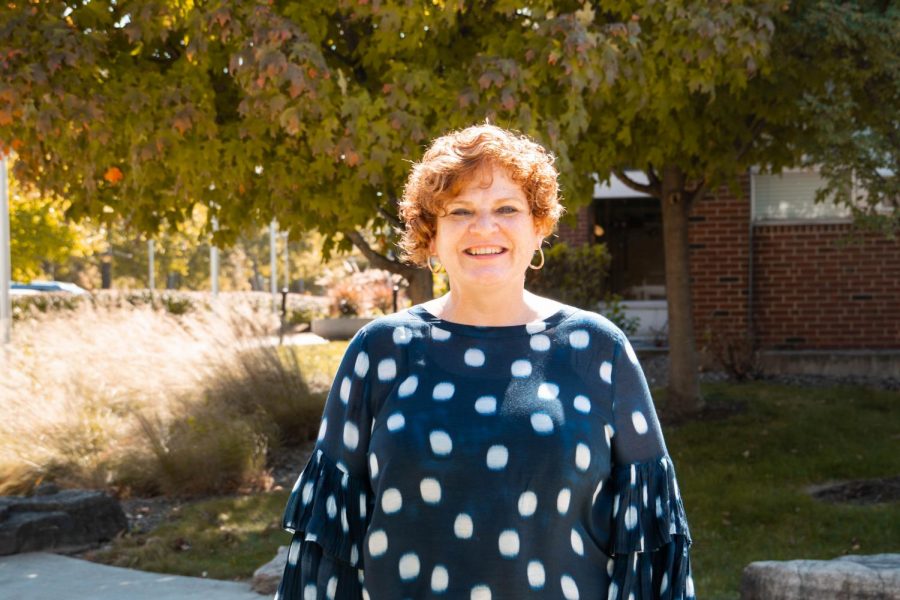Alma Sealine directs University Housing’s safety precautions
Photo Courtesy of Alma Sealine
Executive Director of University Housing Alma Sealine poses for a headshot on Wednesday. Sealine has been in charge of housing during the COVID-19 pandemic.
October 12, 2020
One of the difficulties associated with opening up campus again this fall was how to move thousands of students into University Housing without creating unnecessary risks. Alma Sealine, the executive director of University Housing, has been tackling this issue since March.
Sealine’s position gives her the responsibility to handle all operations and activities that go through University Housing from dining services to room contracts. With thousands of residents and staff struggling to navigate housing situations, this is a sizable task.
Living in the dorms now looks very different to past students’ experience, starting with registration for spaces.
Spaces were intentionally made unavailable online, both to account for quarantine and isolation spaces and to de-densify the floors so residents would not have to worry about crowded living spaces.
As far as procedures for inside the residences, Sealine said, “We are following the CDC Illinois Department of Public Health and our local public health guidelines related to all of our operations.”
Get The Daily Illini in your inbox!
High-traffic surface areas are cleaned three times a day using hospital-grade cleaning products. In the dining halls, all meals were to-go until Sept. 20 when they opened 25% of the space to eat.
Residence Hall Directors have moved most of the programming that typically engages residents online. Most connections taking place between floor members now happens virtually.
“I think that the students who have returned are very resilient,” Sealine said. “They have gotten used to a new expectation, a new normal.”
For the most part, Sealine said students have been cooperative with these new procedures. They also have offered their input and suggestions as to how things can continue to be improved for students.
One additional point of consideration for University Housing was ensuring it remained accommodating for all students who need it. Earlier in the semester, students expressed their concerns over the closing of the Beckwith Residential Support Services Program. This program provides students with physical disabilities support and amenities.
Sealine said that University Housing has stayed true to their commitment to accommodate all students by providing ADA acceptable rooms and hiring personal assistants.
“When students bring to our attention a concern that they have, we work with them and our campus colleagues to try to provide the best service and resources for that student to be able to continue to stay connected and to have a successful experience here,” Sealine said.
Sealine has noticed how regular testing requirements have helped set apart University Housing’s operations from other schools. In speaking to her colleagues across the country, she said comparatively, Illinois offers more safety to its students and staff.
“The nice thing for our regular testing is that we can start to notice trends of where cases are starting to increase,” Sealine said. “We then can start making plans of ‘okay so what’s happening in the lobby areas? Are students hanging out in the hallways where they shouldn’t be?’”
While Sealine said the majority of students comply with the new precautions and regulations, they take it seriously when they receive reports of non-compliance. Students who do not follow the guidelines pose risks to the safety and security of the community. University Housing investigates reports and, in some cases, will administratively cancel individuals’ contracts.
Once this happens, the cases are forwarded to the University Judicial Process. This will determine the status of a student going forward. In some instances, individuals have their student status removed for a period of time.
“I think that when students learn that that is how we are going to respond to lack of compliance, they realize that we are very serious about their safety and security,” she said.
As policies and procedures continue to fluctuate as new safety information emerges, Sealine and her department have worked to maintain stability amidst the chaos. Sealine said everything has been consumed by adjusting to COVID.
“We opened a brand new dining center and a renovated residence hall and in a typical year that would have been the headline for us,” she said. “It’s something that kind of went to the back of my mind and it’s something that we definitely should celebrate.”
Sealine and her team have been working since March to create a safe environment for all those living on campus and relying on the University for housing.
“We, every day, are thinking about their experience and their success and we are trying to respond as quickly as possible to the changing parameters that this pandemic has required,” Sealine said.







